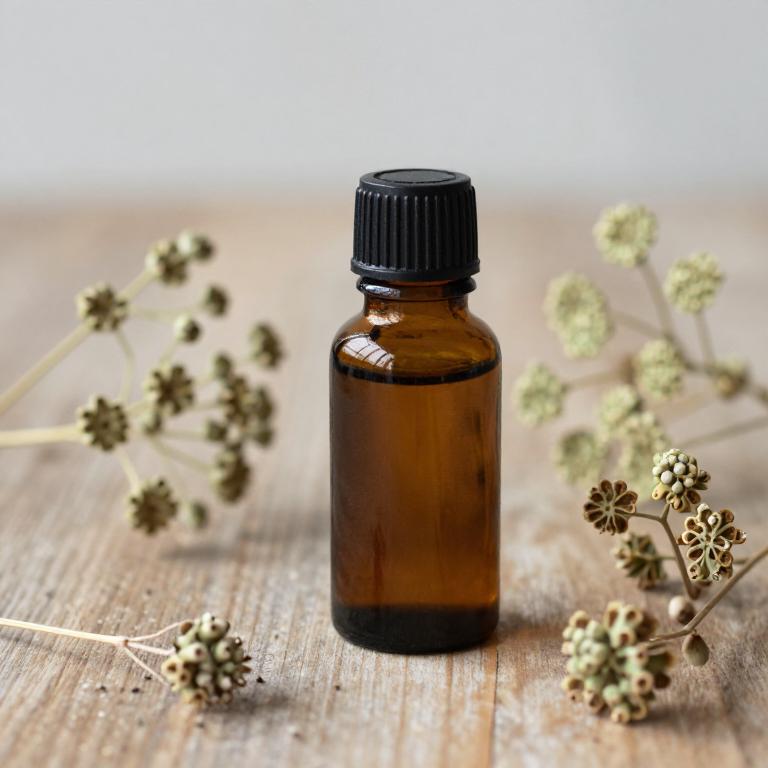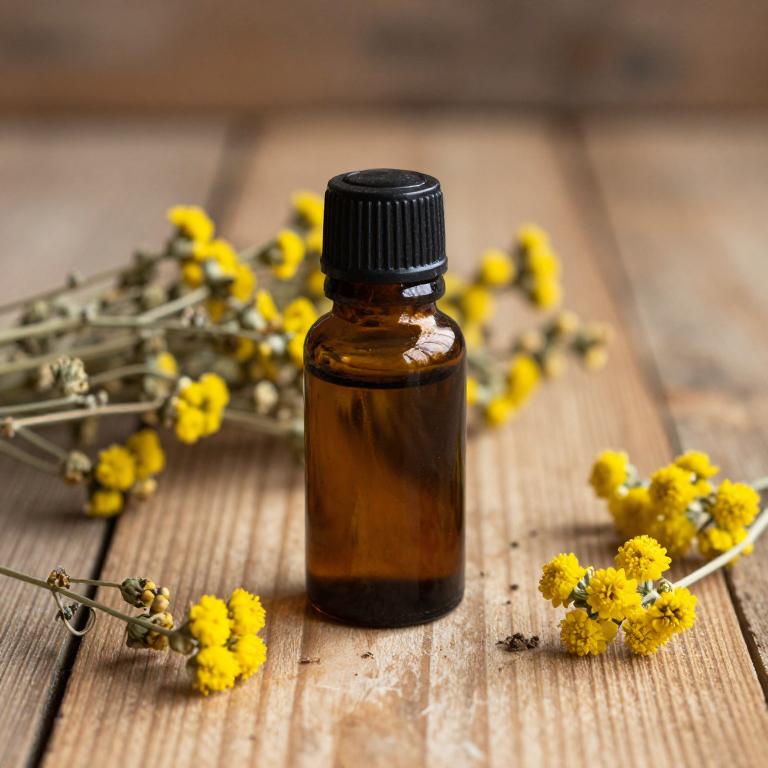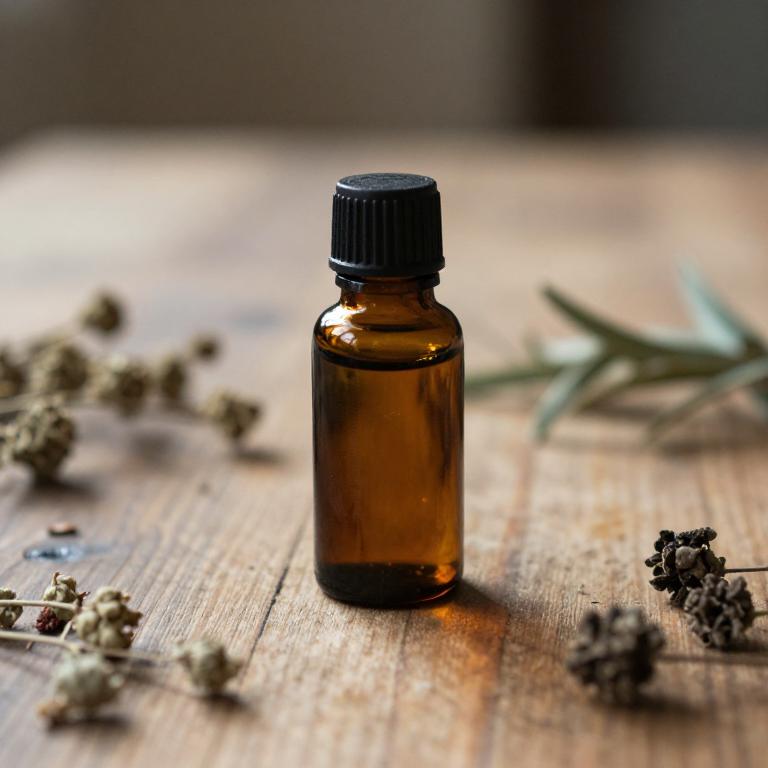10 Best Herbal Essential Oils For Palpitation

Herbal essential oils have been traditionally used to support heart health and may offer relief for individuals experiencing palpitations, which are irregular or rapid heartbeats.
Oils such as lavender, chamomile, and valerian root are known for their calming properties and can help reduce anxiety, a common trigger for palpitations. When used in aromatherapy or diluted for topical application, these oils may promote relaxation and balance the nervous system. However, it is important to consult with a healthcare professional before using essential oils, especially for those with existing heart conditions or who are taking medications.
While essential oils can be a complementary therapy, they should not replace medical treatment for persistent or severe palpitations.
Table of Contents
- 1. Valerian (Valeriana officinalis)
- 2. Black pepper (Piper nigrum)
- 3. Rosemary (Rosmarinus officinalis)
- 4. English lavender (Lavandula angustifolia)
- 5. Lemon balm (Melissa officinalis)
- 6. Salvia (Salvia officinalis)
- 7. Lemon grass (Cymbopogon citratus)
- 8. Ginger (Zingiber officinale)
- 9. Turmeric (Curcuma longa)
- 10. Ceylon cinnamon (Cinnamomum verum)
1. Valerian (Valeriana officinalis)

Valeriana officinalis, commonly known as valerian, is a medicinal herb widely used for its calming properties, particularly in the formulation of essential oils.
Valerian essential oil is derived from the root of the plant through steam distillation and contains compounds such as valerenic acid, which are believed to interact with the central nervous system to reduce anxiety and stress. This oil is often used aromatically or topically to help alleviate symptoms of palpitations, which are rapid or irregular heartbeats often linked to nervous system overactivity. Its sedative effects may help promote relaxation and improve sleep, both of which can indirectly support heart rhythm stability.
However, it is important to consult a healthcare professional before using valerian essential oil, especially for individuals with existing heart conditions or those taking medication.
2. Black pepper (Piper nigrum)

Piper nigrum, commonly known as black pepper, contains essential oils that have been traditionally used for their stimulating and warming properties.
These oils may help to support cardiovascular health by promoting circulation and potentially reducing the frequency of palpitations through their thermogenic effects. The active compound, piperine, is believed to enhance the body's metabolic rate and may help regulate heart rhythm when used in moderation. However, it is important to consult a healthcare professional before using piper nigrum essential oils, especially for individuals with heart conditions or those taking medications.
While some anecdotal evidence suggests potential benefits, more scientific research is needed to fully understand its role in managing palpitations.
3. Rosemary (Rosmarinus officinalis)

Rosmarinus officinalis, commonly known as rosemary, produces essential oils that have been traditionally used for their calming and circulatory benefits.
These oils contain compounds like 1,8-cineole and camphor, which may help in reducing symptoms of palpitations by promoting relaxation and improving blood flow. When used aromatically or topically, rosemary essential oil can help alleviate stress-related palpitations by balancing the nervous system. It is often recommended to dilute the oil with a carrier before applying it to the skin for optimal safety and effectiveness.
While it can be a supportive complementary therapy, it should not replace professional medical advice for persistent or severe palpitations.
4. English lavender (Lavandula angustifolia)

Lavandula angustifolia, commonly known as English lavender, is widely used in aromatherapy for its calming and soothing properties.
The essential oil derived from this plant contains compounds such as linalyl acetate and linalool, which have been shown to reduce stress and anxiety, common contributors to palpitations. When inhaled or applied topically, lavender essential oil can help lower heart rate and promote a sense of relaxation, thereby alleviating symptoms of palpitations. It is often recommended as a natural alternative to pharmaceuticals for managing mild cases of heart irregularities.
However, it is important to consult with a healthcare professional before using lavender oil, especially for individuals with existing heart conditions or those taking medications.
5. Lemon balm (Melissa officinalis)

Melissa officinalis, commonly known as lemon balm, is a herb that has been traditionally used for its calming properties, and its essential oil is often utilized in aromatherapy to help alleviate symptoms of palpitations.
The essential oil contains compounds such as linalool and limonene, which are known for their ability to reduce stress and anxiety, common triggers of palpitations. When inhaled or applied topically, the oil can promote relaxation and help regulate the nervous system, potentially reducing the frequency and intensity of palpitations. However, it is important to consult with a healthcare professional before using essential oils, especially for individuals with heart conditions or those taking medications.
Melissa officinalis essential oil is generally considered safe when used appropriately, but it should be diluted and used with caution to avoid skin irritation or adverse reactions.
6. Salvia (Salvia officinalis)

Salvia officinalis, commonly known as sage, contains essential oils that have been traditionally used for their calming and soothing properties.
These oils, which include compounds like thujone and cineole, may help reduce stress and anxiety, which are common triggers for palpitations. Some studies suggest that the aromatic compounds in sage essential oil can influence the autonomic nervous system, potentially helping to regulate heart rate and ease irregular heartbeats. When used in aromatherapy or diluted for topical application, sage essential oil may offer a natural complement to managing palpitation symptoms.
However, it is important to consult with a healthcare professional before using essential oils, especially for individuals with cardiovascular conditions.
7. Lemon grass (Cymbopogon citratus)

Cymbopogon citratus, commonly known as lemon grass, produces a fragrant essential oil that has been traditionally used for its calming and soothing properties.
This essential oil contains compounds such as myrcene, citral, and geraniol, which are known for their potential to reduce stress and anxiety, common triggers of palpitations. When used aromatically or topically, lemon grass essential oil may help regulate heart rate and promote a sense of tranquility, potentially alleviating symptoms of palpitations. However, it is important to consult with a healthcare professional before using it, especially for individuals with heart conditions or those taking medications.
Despite its natural benefits, the essential oil should be diluted properly to avoid skin irritation and ensure safe application.
8. Ginger (Zingiber officinale)

Zingiber officinale, commonly known as ginger, is a medicinal plant widely used for its essential oils, which are derived from its rhizome.
These essential oils are valued for their potential therapeutic properties, including anti-inflammatory, antioxidant, and cardiovascular benefits. In the context of palpitations, ginger essential oil may help by promoting circulation and reducing stress, which are common triggers for irregular heartbeats. However, it is important to note that while some studies suggest a possible calming effect on the cardiovascular system, more clinical research is needed to confirm its efficacy for palpitations.
As with any essential oil, it should be used cautiously and under the guidance of a qualified healthcare professional.
9. Turmeric (Curcuma longa)

Curcuma longa, commonly known as turmeric, is a widely used herbal remedy that contains curcumin, a compound known for its anti-inflammatory and antioxidant properties.
While essential oils derived from Curcuma longa are not typically used for palpitations directly, some studies suggest that the aromatic compounds in these oils may help reduce stress and anxiety, which are common triggers for palpitations. Essential oils from turmeric are often used in aromatherapy to promote relaxation and cardiovascular health, potentially supporting the body's natural rhythms. However, it is important to consult with a healthcare professional before using these oils, especially for individuals with heart conditions or those taking medications.
Overall, while Curcuma longa essential oils may offer indirect benefits for palpitations through stress reduction, they should not replace conventional medical treatments.
10. Ceylon cinnamon (Cinnamomum verum)

Cinnamomum verum, commonly known as true cinnamon, contains essential oils that have been traditionally used for their aromatic and therapeutic properties.
The essential oil derived from its bark is rich in compounds like cinnamaldehyde, which may help in calming the nervous system and reducing stress-related palpitations. Some studies suggest that the anti-inflammatory and antioxidant properties of cinnamon essential oil could support heart health by improving circulation and reducing oxidative stress. However, while anecdotal evidence supports its use for palpitations, more clinical research is needed to confirm its efficacy.
It is important to consult with a healthcare professional before using cinnamon essential oil, especially for individuals with cardiovascular conditions or those taking medications.